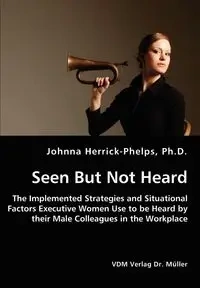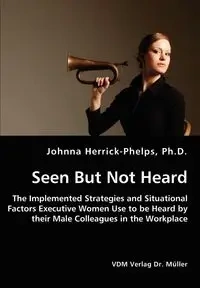Seen But Not Heard - The Implemented Strategies and Situational Factors Executive Women Use to be Heard by their Male Colleagues in the Workplace - Johnna Herrick-Phelps
Seen But Not Heard - The Implemented Strategies and Situational Factors Executive Women Use to be Heard by their Male Colleagues in the Workplace - Johnna Herrick-Phelps
AutorzyJohnna Herrick-Phelps
EAN: 9783836437233
Symbol
764EXI03527KS
Rok wydania
2008
Elementy
136
Format
17.0x24.4cm
Język
angielski

Bez ryzyka
14 dni na łatwy zwrot

Szeroki asortyment
ponad milion pozycji

Niskie ceny i rabaty
nawet do 50% każdego dnia
Niepotwierdzona zakupem
Ocena: /5
Symbol
764EXI03527KS
Kod producenta
9783836437233
Autorzy
Johnna Herrick-Phelps
Rok wydania
2008
Elementy
136
Format
17.0x24.4cm
Język
angielski

In the last three decades the numbers of women working in the workforce have increased considerably. In fact, more women working outside the home is the rule in today's society rather than the exception. Of course successes do not come without challenges.
This study examines one of those challenges: the implemented strategies and the influential situational factors that impact how executive women are heard by their male colleagues in the workplace. Self- efficacy, women's adult development theory, and mentoring theory informed the design of this explorative descriptive study. The research design used study participants' reactions and perceptions to a video of a 30-second vignette depicting a board meeting in which a woman executive interacts with men colleagues who ignore her suggestions for improving a company's status. In addition, respondents completed semi-structured interviews and a pencil-and-paper assessment of self-efficacy. Qualitative responses to the vignette and interview revealed nine strategies among the women. Fifteen of the study participants found situational factors to be influential. The general self-efficacy scale showed that the study cohort, as a group, achieved an overall higher mean score than that of the average score on the general self-efficacy scale. Findings suggest that executive women in mid-sized, for-profit organizations experience daily challenges in having their voices heard by their male colleagues. The use of multiple strategies, strong perceived self-efficacy, and a mentor appear to be influential in helping executive women feel they are heard by their male colleagues in the workplace. This book is directed toward researchers in women's studies and leadership development.
EAN: 9783836437233
EAN: 9783836437233
Niepotwierdzona zakupem
Ocena: /5
Zapytaj o produkt
Niepotwierdzona zakupem
Ocena: /5
Napisz swoją opinię

